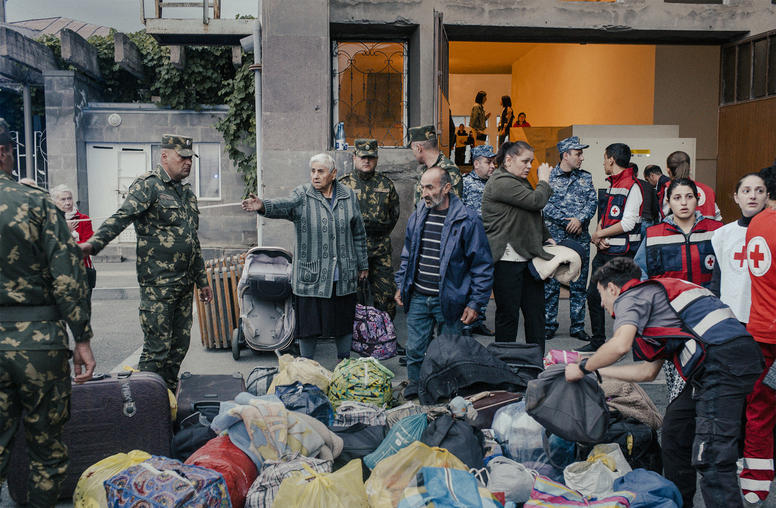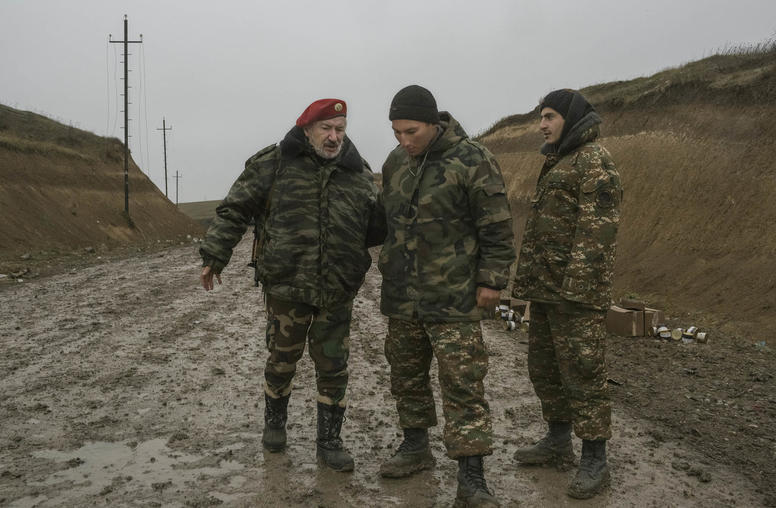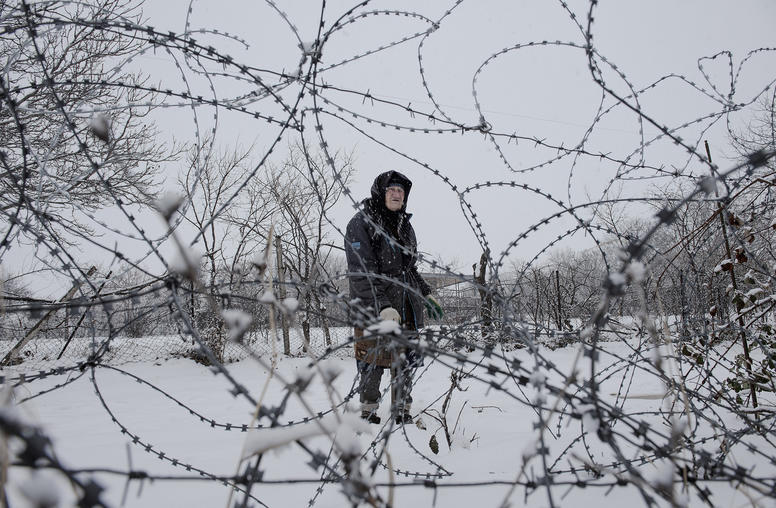Ann Phillips on Azerbaijan-Armenia Conflict
As fighting over Nagorno-Karabakh continues to escalate, USIP’s Ann Phillips breaks down the complex geopolitical stakes that have sprung up around the conflict, which “has been simmering, and ebbing and flowing, ever since the implosion of the Soviet Union.”
On Peace is a weekly podcast sponsored by USIP and Sirius XM POTUS Ch. 124. Each week, USIP experts tackle the latest foreign policy issues from around the world.
Transcript
Tim Farley: The situation has gotten much worse in a border dispute between Azerbaijan and Armenia. This is not something that's new, by the way. This has been around for many, many years, but the latest development shows that hundreds of fighters from Syrian militias have joined with Turkey in this fight over this disputed bit of territory, hundreds more preparing to go, that according to two Syrians involved in the effort, that's a report from the Wall Street Journal this morning. This is a developing story, but it is one that requires some context and it also has some important consequences for us in the U.S. That's why we're pleased that Ann Philips can join us this morning. Ann Philips, Ph.D., senior advisor of the Nagorno-Karabakh project at the U.S. Institute of Peace, is joining us. Twitter handle is at @USIP. Ann Philips, welcome. Thank you for being here.
Ann Phillips: Good morning.
Tim Farley: Tell us more, first of all, about the dispute. I mean, it's, as I mentioned, decades old, this particular territory Nagorno-Karabakh, maybe you can help us understand what is at the roots of the conflict between these two countries.
Ann Phillips: Well, this is a legacy of the Soviet system. Nagorno-Karabakh was set up as an autonomous oblast within the Soviet system, but located within the Republic of, the Soviet Socialist Republic of Azerbaijan. And when the Soviet Union began to unravel, the Armenians in Karabakh requested a change of jurisdiction from the Soviet leader Gorbachev in about 1987. It's important to note also that Nagorno-Karabakh was multi-ethnic, there were Armenians, largely Armenians, but also some 20-plus percent of Azeris living there, as well as Greeks, Russians and Kurds. So, it has it multi-ethnic heritage. But, as I said, with the unraveling of the Soviet Union, the Armenians wanted to change their status. And important to note, also, with the implosion of the Soviet Union, then all the rules, norms, and incentives that are governed in public life were no longer there. So, at this time, politicians, new and old politicians, reverted to nationalism to win public support, intellectuals joined in, power structures and interests became linked to ethnicity, and this led to growing insecurity in both Armenia and Azerbaijan, with Nagorno-Karabakh as a focal point.
Tim Farley: You know, I'm not sure that it is a parallel, but I'm reminded of Yugoslavia when Josip Tito was the dictator and upon his death, we saw the unraveling of what had been, you know, fractionally a united country, and in this particular case, as you say, with the Soviet Union disappearing, but there are still connections to Russia, there are also connections to Turkey, which is on the border and it seems to me that these unusual alliances are complicating things even more and also making it fraught with possible disaster for the U.S.
Ann Phillips: Good points and your parallel with Yugoslavia is perfectly apt, where the rise of nationalism became the mobilizing force in the vacuum, as it were, created by the implosion of that country. Yes, and certainly a major change has occurred in Turkey's stronger involvement. In the past, it's always had good relations with Azerbaijan. Turks and Azeris are closely related ethnically and linguistically, but Turkey has really supported Azerbaijan efforts 100-plus percent in its efforts to regain territory that it lost to Armenia in the 1992-94 major war. And, also, Armenia, at that time, as a result of that war, Armenian forces took control of Nagorno-Karabakh, as well. So, Russia is certainly involved. Russia has good relations with both Armenia and Azerbaijan, but it has a security agreement with Armenia.
You will note that the security agreement, however, does not apply to Nagorno-Karabakh. So, the Azeri forces have been very careful up to perhaps today in not attacking Armenia proper, because that security arrangement with or security partnership between Armenia and Russia is not activated, unless Armenia proper is attacked. And that has not happened until recently. There were reports today, that Azeris had struck missile sites in Armenia, which Azerbaijan argues are responsible for missile attacks on civilians in in Azeri towns near the border area, including Ganja, which is the largest city, second-largest city in Azerbaijan. And it's about 100 kilometers from the conflict area proper.
Tim Farley: To make it even more complicated, for those who are not quite familiar with Turkey is just to the west of Armenia, Armenia is between Turkey and Azerbaijan. Of course, we get that little thing the Armenian Genocide, which they have never resolved. But that is the geographical makeup. Armenia and Azerbaijan, both share a border with Iran. Syria is not far away. Now, they're evidently involved in this as well, of course, the United States has its NATO alliance with Turkey and the United States and Russia are whatever the two are, what are the special concerns that we should have relative to US involvement, not just the fact that the region could explode, and there could be more people piling onto the alliances? But what, where's the United States' interest in all of this?
Ann Phillips: Well, there are two areas, I think two important points: one, of course, Turkey is a NATO ally. And should Russian forces attack Turkey, there's no indication that either Russia or Turkey wants to expand the conflict, escalate the conflict and have direct military engagement, one with the other. But should Russian forces attack Turkish forces, which by the way, are not yet directly involved in the fighting? If provided support, then, of course, Turkey could invoke Article Five, and NATO would have to make a decision about supporting Turkey and the ramifications of not supporting Turkey or supporting Turkey are enormous for the viability of the Alliance itself. The U.S. is also a part of the Minsk Group, which was established in 1994, by the Organization for Security and Cooperation in Europe, to provide a pathway, provide a framework for the two parties to reach a durable peace. The U.S. is one of three co-chairs, along with Russia and France. So, the United States government has assumed some responsibility for helping to resolve, helping the two parties to resolve this conflict, which as you pointed out before, has been simmering and ebbing and flowing ever since the implosion of the Soviet Union.
Tim Farley: My last question: is it best for the U.S. right now to wait and see? Are there efforts, do you think, underway to do anything to try to help negotiate a peace? Or is this something that we just sort of stay out of until there's closer, more of a sense of resolution?
Ann Phillips: Well, the U.S., Russia and France, as co-chairs, the Minsk group have all issued calls for cessation of hostilities, for both parties to return to the negotiating table. Secretary of State Mike Pompeo issued a statement yesterday, I believe, again, calling for this and also affirming that both parties need to adhere to their responsibility to protect civilian lives in this conflict, they have a responsibility to do this and civilians on both sides have been killed. So I think the U.S. has good relations with both Armenia and Azerbaijan and so could serve as an important co-chair in kind of an honest broker role in helping to bring the parties back to a peaceful, first a ceasefire, and then hopefully negotiations that will lead to a durable peace.
Tim Farley: It is not something that's getting a lot of headlines, but it is worthy of the discussion. And I'm glad you could join us today, Ann Philips thanks for being on POTUS.
Ann Phillips: Thank you very much.
Tim Farley: Ann Philips, Ph.D., senior advisor of the Nagorno-Karabakh project to the U.S. Institute of Peace, that is the border dispute between Armenia and Azerbaijan over that key territory. Some thoughts about why we should be interested, concerned, perhaps, about what's going on. The Twitter handle is @USIP.



